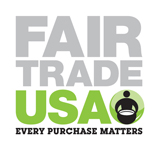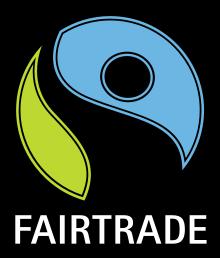
Fair trade is a term for an arrangement designed to help producers in developing countries achieve sustainable and equitable trade relationships. The fair trade movement combines the payment of higher prices to exporters with improved social and environmental standards. The movement focuses in particular on commodities, or products that are typically exported from developing countries to developed countries but is also used in domestic markets, most notably for handicrafts, coffee, cocoa, wine, sugar, fruit, flowers and gold.

Fairtrade International, or Fairtrade Labelling Organizations International E.V. is a product-oriented multistakeholder group aimed at promoting the lives of farmers and workers through trade. Fairtrade's work is guided by a global strategy focused on ensuring that all farmers earn a living income, and agricultural workers earn a living wage. Fairtrade works with farmers and workers of more than 300 commodities. The main products promoted under the Fairtrade label are coffee, cocoa, banana, flowers, tea, and sugar.

The Fairtrade Foundation is a charity based in the United Kingdom that aims to help disadvantaged producers in developing countries by tackling injustice in conventional trade, in particular by promoting and licensing the Fairtrade Mark, a guarantee that products retailed in the UK have been produced in accordance with internationally agreed Fairtrade standards. The foundation is the British member of FLO International, which unites FLO-CERT, 25 National Fairtrade Organisations and 3 Producer Networks across Europe, Asia, Latin America, North America, Africa, Australia and New Zealand.

The Rainforest Alliance is an international non-governmental organization (NGO) with staff in more than 20 countries and operations in more than 70 countries. It was founded in 1987 by Daniel Katz, an American environmental activist, who serves as the chair of the board of directors. The NGO states that its mission is "to create a more sustainable world by using social and market forces to protect nature and improve the lives of farmers and forest communities." Its work includes the provision of an environmental certification for sustainability in agriculture. In parallel to its certification program, the Rainforest Alliance develops and implements long-term conservation and community development programs in a number of critically important tropical landscapes where commodity production threatens ecosystem health and the well-being of rural communities.
FLOCERT is one of the world’s leading social auditing and verification bodies and the global certifier for Fairtrade. With a vision of combating poverty and securing sustainable livelihoods for farmers in developing countries, FLOCERT's focus lies on auditing global supply chains and guaranteeing compliance with Fairtrade Standards.

The 'International Fairtrede Certification Mark is an independent certification mark used in over 69 countries. It appears on products as an independent guarantee that a product has been produced according to Fairtrade political standards.

Fair Trade USA, formerly "TransFair USA", is a 501(c)(3) non-profit organization that sets standards, certifies, and labels products that promote sustainable livelihoods for farmers and workers and protect the environment.

Fairtrade Canada, formerly TransFair Canada, is a national non-profit certification and public education organization promoting Fairtrade certified products in Canada to improve the livelihood of developing world farmers and workers. It is the Canadian member of FLO International, which unites 24 fair trade producer and certification initiatives across Europe, Asia, Latin America, North America, Africa, Australia and New Zealand.

Fairtrade Nederland formerly known as Max Havelaar StichtingArchived 2022-08-16 at the Wayback Machine is the Dutch member of Fairtrade International, which unites 23 Fairtrade certification producer and labelling initiatives across Europe, Asia, Latin America, North America, Africa, Australia and New Zealand.
The fair trade movement has undergone several important changes like the operation for ten thousand villages to open their businesses since early days following World War II. Fair trade, first seen as a form of charity advocated by religious organizations, has radically changed in structure, philosophy and approach. The past fifty years have witnessed massive changes in the diversity of fair trade proponents, the products traded and their distribution networks.
The fair trade debate concerns the ethics and economic implications of fair trade, a term for an arrangement designed to help producers in developing countries achieve sustainable and equitable trade relationships. The benefits of fair trade for farmers and workers can vary considerably and the social transformation impacts also vary around the world. However the main concerns from critics is that fair trade may give an unfair advantage to some producers over others.

UTZ, formerly called UTZ Certified, is a program and a label for sustainable farming. The organization was founded as a non-profit in the Netherlands in 2002. The UTZ label is featured on more than 10,000 product packages in over 116 countries. In 2014, UTZ was reported to be the largest program for sustainable farming of coffee and cocoa in the world. The UTZ program addresses agricultural practices, social and living conditions, farm management, and the environment. In January 2018, UTZ officially merged with the Rainforest Alliance in response to the increasing challenges of deforestation, climate change, systemic poverty, and social inequity.

The Max Havelaar Foundation is a non-profit certification and public education organization promoting Fairtrade products in Switzerland to improve the livelihood of developing world farmers and workers. The Max Havelaar Foundation is the Swiss member of FLO International, which unites 23 Fairtrade producer and labelling initiatives across Europe, Asia, Latin America, North America, Africa, Australia and New Zealand. Several of these corresponding organizations in other European countries also use the Max Havelaar name. The Swiss Max Havelaar organization was founded in 1992 by the Third World aid organisations Brot für alle, Caritas, Fastenopfer, HEKS, Helvetas and Swissaid.

Fair trade coffee is coffee that is certified as having been produced to fair trade standards by fair trade organizations, which create trading partnerships that are based on dialogue, transparency and respect, with the goal of achieving greater equity in international trade. These partnerships contribute to sustainable development by offering better trading conditions to coffee bean farmers. Fair trade organizations support producers and sustainable environmental farming practices and prohibit child labor or forced labor.
Direct trade is a form of sourcing practiced by certain coffee roasters, chocolate makers, tea sellers, gemologists and more who build direct relationships with the farmers, artisanal miners and processors who sell their products. There is no single set of direct trade standards, and specific trade practices vary as a reflection of business and ethical priorities of the roaster or maker. Generally speaking, however, direct trade practitioners view their model as one of mutually-beneficial and transparent trade relationships.

The Union of Indigenous Communities of the Isthmus Region is a farmer's cooperative in the state of Oaxaca, Mexico. It was established in 1982 to assist in production, marketing and distribution of locally produced coffee and other products. UCIRI was a pioneer of organic coffee production and one of the first fair trade suppliers.
Sustainability standards and certifications are voluntary guidelines used by producers, manufacturers, traders, retailers, and service providers to demonstrate their commitment to good environmental, social, ethical, and food safety practices. There are over 400 such standards across the world.

Fair trade cocoa is an agricultural product harvested from a cocoa tree using a certified process which is followed by cocoa farmers, buyers, and chocolate manufacturers, and is designed to create sustainable incomes for farmers and their families. Companies that use fair trade certified cocoa to create products can advertise that they are contributing to social, economic, and environmental sustainability in agriculture.
Fairtrade bananas was a marketing initiative which focused on increasing the price paid to small banana growers and the wages of agricultural workers. This is not a commercial brand, but a marketing strategy. Fair trade is based on higher prices paid by consumers that allow an equitable distribution of gains from trade over the chain partners.
The Federación Campesina del Cauca is a non-profit, member-owned federation of coffee grower associations based in the Cauca Department of Colombia. It was found in 1971 as a congress of farmers, but has since formalized into a cooperative serving the interests of 630 coffee farmers from six local sub-groups. The federation was licensed FLO Cert in 2004, and has since acquired certification for producing both conventional and organic coffee.












